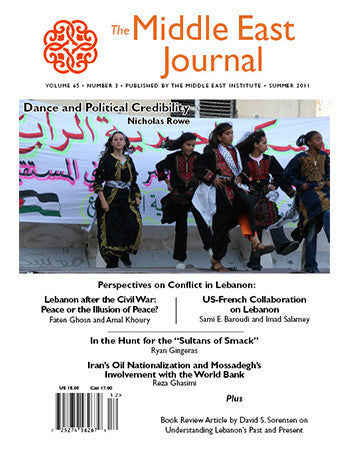
MIDDLE EAST JOURNAL
Jerusalemites
Love for Jerusalem and devotion to the cause of justice and the human rights of the Palestinians are dominant features of this autobiography written by a distinguished man born in the Holy City in 1922 when it was the capital of Palestine. His family which descends from Nusaybah bint Ka‘b (d. 634 AD) - a warrior female Companion of Prophet Muhammad - was one of the earliest Muslim Arab clans of Medina that settled in Jerusalem in 638 AD with the Arab conquest and inhabited it ever since, and many of its members occupied prominent positions in the city and the region throughout history.
Of them, Hazem Zaki Nusseibeh is one modern example. Author of several books including The Ideas of Arab Nationalism (1956, Arabic translation 1959) and Palestine and the United Nations (1982), he occupied several important positions in the Hashemite Kingdom of Jordan. He served as Jordan's Foreign Minister (1962-1966) and as Minister of Reconstruction and Development (1967-1968). He then became Jordan's ambassador to several countries: Egypt (1969-1971), Turkey (1971-1972), Italy, Switzerland and Austria (1972-1974). He was later appointed Jordan's Permanent Representative to the United Nations (1976-1982). In all these positions, not least as Jordan's Foreign Minister and as Jordan's UN representative, he was outspoken in the defense of Palestinian rights.
In his autobiography, he tells of growing up in Jerusalem during the British Mandate, and of his education at Rawdah College in Jerusalem and at Victoria College in Alexandria, after which he earned a BA in 1943 from the American University of Beirut, and a law degree in 1948 from the Jerusalem Law School. Briefly employed in the administration of news services in Jerusalem under the British Mandate and later in the radio broadcasting station in Ramallah under Jordan's rule, he subsequently studied at Princeton University where he earned an MPA, an MA, and then graduated with a PhD in 1954. On his return to Jordan, he occupied by turns several government positions including one on the Jordan-Israeli Mixed Armistice Commission in 1955-1956, another in charge of the affairs of Palestinian refugees in Jordan in 1957-1959, and later as Jordan's representative at the UNRWA advisory council and at the World Bank's annual meetings in 1959-1960, before assuming the position of Minister of the Royal Court and his other successive political and diplomatic responsibilities mentioned above.
Having this vast experience in national and international affairs as his autobiography clearly shows, Dr. Nusseibeh speaks with authority and humility. His English is impeccable and his style frank. He is at his best when describing his beloved Jerusalem - and he is most interesting when reporting on his meetings with heads of state and world political personalities in the course of his long and illustrious career, and also when he provides inside accounts of major events that he witnessed or participated in, and others that show the human element of great men.
As an example of the latter, he relates that he was asked by King Husayn to represent him in the summer of 1965 at the summit meeting of the Non-Aligned states to be held in Indonesia in celebration of the 10th anniversary of the 1955 Bandung Conference, the principal architects of which had been President Nehru of India, President Nasser of Egypt, and Marshall Tito of Yugoslavia. The summit was attended by about 35 heads of state and government including Ahmed Sukarno, Chou En-lai, Zulfiqar Ali midle east journalM 519 Bhutto, and many other Third World leaders from Asia, Africa, and Latin America. Sitting in the hall before a banquet given by President Sukarno at his beautiful retreat, Dr. Hazem Nusseibeh found himself next to Chou En-lai and Sukarno. Conveying Jordan's profound gratitude to Chou En-lai for China's support of the Palestinian cause, he was amazed to see Sukarno react emotionally on hearing him, for he said, "What about us?" He later told him that Indonesia's support as a brotherly Islamic country was taken for granted and did not need any commendation. Dr. Nusseibeh wondered to himself how even great men cannot contain or control such basic instincts as jealousy, and he says, "It seems that everybody needs a pat on the back" (p. 171).
Dr. Nusseibeh's autobiography offers insights into many politically hot topics of the time and sheds light on many national and international events that interest readers concerned with Palestine and the Middle East. But he does not forget to remind them also that the Nusseibeh family has an important function in Jerusalem in relation to the Christians' holiest site, the Church of the Holy Sepulchre, whose gate up to this day must be opened at dawn and closed at dusk by a member of the Nusseibeh family since the time of Caliph ‘Umar in the 7th century AD (p. 23) and since, after his victory over the Crusades - Sultan Saladin in the 12th century AD granted the Nusseibeh family the custody of the church keys (p. 397) for this purpose.
Nusseibeh recognizes the role of the Christians in Jerusalem throughout history, and he speaks highly of the contributions of the modern Arab Christian community in the city, numerically almost equal to their Muslim compatriots. He mentions by name (pp. 411-413) many of Jerusalem's distinguished Arab Christians and their achievements, with some of whom he has had a close friendship; and he says how this community of diverse skills and achievements was uprooted on May 15, 1948 by the Zionist war machine, decimated overnight, and dispersed like their Muslim brethren in greater Jerusalem. He regrets that, since Israel's conquest of East Jerusalem in June 1967, the Arab Christian presence in the city was further diminished.
This book offers a truly living memory of Jerusalem, Jerusalemites, and Palestine. It is a welcome addition to works aiming at the understanding of the tragedy of the Holy Land and its Arab people, and it is a good personal record of the efforts of one of its sons seeking justice and peace for his homeland, and the restoration of the human and civil rights of his people.
Reviewed by Issa J. Boullata
Professor Emeritus of Arabic Literature, McGill University, Montreal
MIDDLE EAST JOURNAL
Volume 65, No.3, Summer 2011
BOOK REVIEWS, PAGE 518


